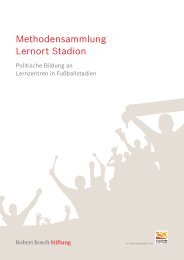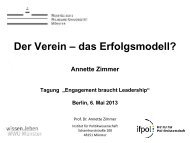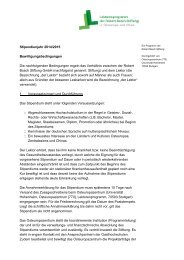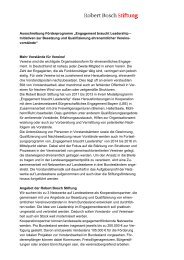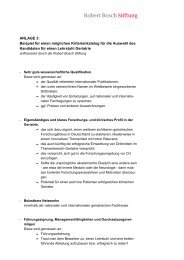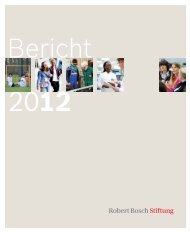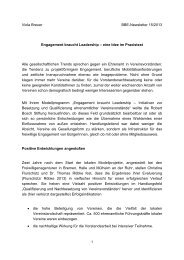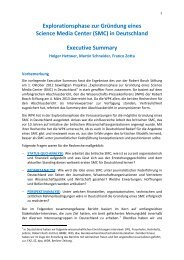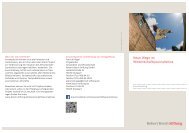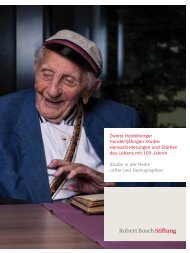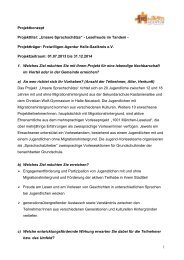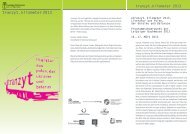Turkey, Its Neighbors and the West - Robert Bosch Stiftung
Turkey, Its Neighbors and the West - Robert Bosch Stiftung
Turkey, Its Neighbors and the West - Robert Bosch Stiftung
You also want an ePaper? Increase the reach of your titles
YUMPU automatically turns print PDFs into web optimized ePapers that Google loves.
<strong>Turkey</strong> from a Transatlantic Perspective<br />
Evaluating <strong>Turkey</strong>’s Foreign Policy<br />
observers in <strong>Turkey</strong>, <strong>the</strong> eu <strong>and</strong> <strong>the</strong> united states have<br />
offered different interpretations of Turkish foreign policy.<br />
Critics have claimed that <strong>Turkey</strong> is drifting east because<br />
of strategic or cultural affinities with russia or <strong>the</strong> Middle<br />
east, <strong>and</strong> that <strong>the</strong> <strong>West</strong> is <strong>the</strong>refore “losing <strong>Turkey</strong>.” 36 a<br />
more neutral interpretation would suggest that <strong>Turkey</strong> is<br />
now an autonomous regional power that acts according to<br />
its own national interest <strong>and</strong> foreign policy objectives, which<br />
often align with eu <strong>and</strong> u.s. goals, but occasionally differ.<br />
optimists would argue that <strong>Turkey</strong> is now a model for its<br />
region, <strong>and</strong> a channel through which <strong>the</strong> <strong>West</strong> can nurture<br />
liberal ideas <strong>and</strong> practices. To do so, however, <strong>Turkey</strong> needs<br />
to be engaged <strong>and</strong> anchored in its neighborhood.<br />
Which of <strong>the</strong>se interpretations is “right” is a matter of<br />
perception. Most frequently, <strong>Turkey</strong>’s policies are judged by<br />
how much <strong>the</strong>y converge or diverge from those of <strong>the</strong> united<br />
states <strong>and</strong> <strong>the</strong> eu. using this metric, <strong>Turkey</strong> can be praised<br />
for <strong>the</strong> improvement of its relations with Iraq, its attempts<br />
at normalizing its ties to armenia, <strong>and</strong> its efforts to mediate<br />
conflicts in <strong>the</strong> Middle east, particularly between Israel <strong>and</strong><br />
syria, Israel <strong>and</strong> hamas, <strong>and</strong> even <strong>the</strong> united states <strong>and</strong> Iran.<br />
but <strong>Turkey</strong> can be criticized on o<strong>the</strong>r issues: its increased<br />
overtures toward Iran, syria or russia; its open political<br />
channels with Islamist movements such as hamas <strong>and</strong><br />
hezbollah; <strong>and</strong> its pro-Islam double st<strong>and</strong>ards in denouncing<br />
genocide in Xinjiang while denying it in Darfur. 37<br />
but this approach misses <strong>the</strong> point that <strong>Turkey</strong> may represent<br />
an asset to <strong>the</strong> <strong>West</strong>ern alliance precisely because its<br />
policies in <strong>the</strong> neighborhood are distinct <strong>and</strong> not simply a<br />
replica of (often unsuccessful) american <strong>and</strong> eu policies in<br />
<strong>the</strong>se regions. Thus, <strong>Turkey</strong>’s policies <strong>and</strong> <strong>the</strong> impact <strong>the</strong>y<br />
have on <strong>the</strong> region should be evaluated in <strong>the</strong>ir own right to<br />
determine if <strong>the</strong>y are complementary or run counter to eu <strong>and</strong><br />
u.s. aims.<br />
for example, <strong>Turkey</strong>’s ties to syria <strong>and</strong> hamas could<br />
complement u.s. mediation efforts in <strong>the</strong> arab-Israeli conflict.<br />
solutions to <strong>the</strong> Middle east’s problems are unlikely to emerge<br />
without <strong>the</strong> engagement of <strong>the</strong>se players. 38 <strong>Turkey</strong> alone does<br />
not have <strong>the</strong> influence to broker a breakthrough. but it could<br />
pave <strong>the</strong> way for more effective u.s. involvement <strong>and</strong> impact.<br />
<strong>Turkey</strong> could also help insert <strong>the</strong> logic of conditionality in<br />
relations with Israel – i.e., putting conditions on Israel based<br />
on Israel’s actions in <strong>the</strong> arab-Israeli conflict. The united<br />
states <strong>and</strong> eu have persistently shied away from doing so,<br />
a fact that has repeatedly detracted from <strong>the</strong> prospect for<br />
peace in <strong>the</strong> region. 39 <strong>Turkey</strong>’s “tough love” toward Israel,<br />
if proportional (i.e., not excessive) <strong>and</strong> consistent (i.e.,<br />
toward all parties based on similar criteria), would mark a<br />
potentially constructive contrast to u.s. <strong>and</strong> eu policies in<br />
<strong>the</strong> Middle east.<br />
as a democratizing state, <strong>Turkey</strong> can complement u.s. <strong>and</strong><br />
eu democracy assistance policies in <strong>the</strong> neighborhood, which<br />
suffered a considerable credibility blow during <strong>the</strong> presidency<br />
of George W. bush. The most striking aspect of <strong>the</strong> Turkish<br />
experience in this regard is that <strong>the</strong> government does not<br />
have an openly declared policy of promoting democracy.<br />
Instead it relies heavily on <strong>the</strong> idea of leading by example,<br />
while noting that Turkish democracy is a “work in progress.”<br />
This avoids <strong>the</strong> hierarchical relationship that inevitably exists<br />
between well-established democracies <strong>and</strong> those countries<br />
on <strong>the</strong> receiving end of democracy promotion policies.<br />
The Turkish government also emphasizes <strong>the</strong> importance of<br />
extending democratic assistance indirectly. for example, <strong>the</strong><br />
Turkish development agency TIKa in 2008 channeled almost<br />
usD 800 million to 98 countries, many of <strong>the</strong>m within its<br />
neighborhood. a portion of <strong>the</strong>se funds was directed to “good<br />
governance” programs, as well as those that empower women.<br />
since a Turkish national was elected as secretary General<br />
of <strong>the</strong> oIC, <strong>the</strong>re have also been efforts to pursue similar<br />
projects among oIC members. 40 unlike with <strong>the</strong> eu <strong>and</strong> <strong>the</strong><br />
united states, <strong>the</strong>re is a conscious effort in <strong>the</strong>se programs to<br />
avoid using <strong>the</strong> term “democracy” aggressively; <strong>the</strong>y favor a<br />
more indirect approach. fur<strong>the</strong>r, Turkish nGos have engaged<br />
in activities <strong>and</strong> projects in neighboring countries promoting<br />
<strong>the</strong> diffusion of democratic values <strong>and</strong> entrepreneurship,<br />
more often than not in an indirect manner.<br />
In this light, <strong>the</strong> united states <strong>and</strong> <strong>the</strong> eu ought to consider<br />
tapping into <strong>the</strong> Turkish experience in development <strong>and</strong><br />
democracy assistance by partnering with ankara on official<br />
<strong>and</strong> civilian fronts. Doing so would generate positive<br />
influences on <strong>Turkey</strong>’s own democratization efforts, which<br />
need external support because of <strong>Turkey</strong>’s position between<br />
two geopolitical regions: one characterized by democracy to<br />
<strong>the</strong> west, <strong>and</strong> <strong>the</strong> o<strong>the</strong>r by ei<strong>the</strong>r very weak democracies or<br />
authoritarianism to its north, east, <strong>and</strong> south.<br />
C H A P T E R5<br />
29



